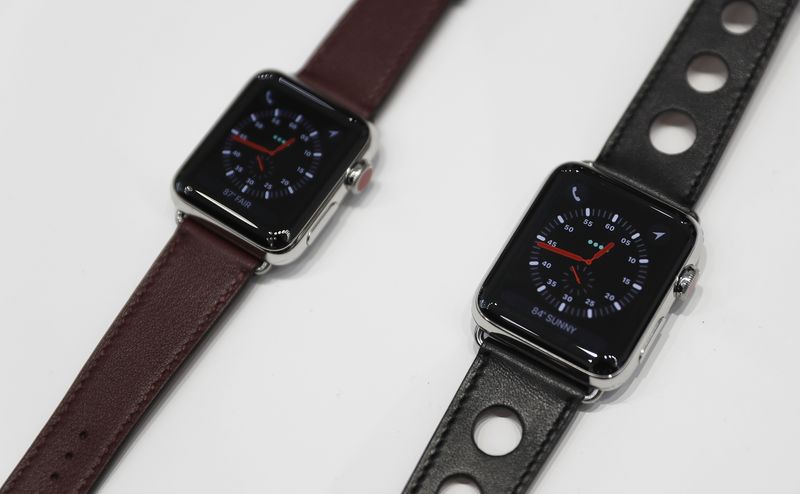By Stephen Nellis
CUPERTINO, Calif. (Reuters) - Apple Inc (O:AAPL) on Tuesday rolled out its much-anticipated iPhone X, a glass and stainless steel device with an edge-to-edge display that Chief Executive Tim Cook called "the biggest leap forward since the original iPhone."
The launch contained few surprises, with leaked details on the phone and other products including an updated Apple Watch proving largely accurate. But the iPhone X's $999 (752.09 pounds) price still raised eyebrows, and its Nov. 3 ship date prompted questions about possible supply constraints ahead of the holiday season.
Investors and fans have viewed the tenth-anniversary iPhone launch as an opportunity for Apple to refresh a smartphone lineup that had lagged the competition in new features. Last year the company's revenue declined when many consumers rejected the iPhone 7 as being too similar to the iPhone 6.
The iPhone X has wireless charging, an infrared camera and hardware for facial recognition, which replaces the fingerprint sensor for unlocking the phone. The home button is also gone, and users instead tap the device to wake it up.
Apple normally ships new products within a week or two of announcing them, though Cook said the later date was consistent with earlier guidance to investors.
"It's great to have a product but we'd have liked it sooner rather than later, more like the beginning of October or mid- October," said Kim Forrest, senior equity research analyst at Fort Pitt Capital Group in Pittsburgh.
Apple shares closed down 0.4 percent. They had traded as much as 1 percent higher during the launch event before reversing course.
Tim Ghriskey, chief investment officer of Solaris Asset Management in New York, said he was not worried about the ship date and liked the new phones features, but also flagged a lack of surprises.
"It's sell on the news," he said. "They didn't talk about the evolution of Apple beyond the iPhone and into artificial intelligence."
The screen on the iPhone X is about the size of the current iPhone 7 plus, though the phone is smaller. It features richer colours thanks to a new technology called OLED that other vendors are also rolling out.
But in an embarrassing moment for Apple senior vice president Craig Federighi, the face ID unlocking did not work on his first attempt during the on-stage presentation.
Apple also introduced the iPhone 8 and iPhone 8 Plus, which resemble the iPhone 7 line but have a glass back for wireless charging. The company said it was working on a new device, called the Airpad, that would charge all newer Apple products.
The wireless charging uses a standard called Qi, also used by Samsung (LON:0593xq), and will work with third-party devices.
The new phones all feature Apple's first proprietary graphics processor, which provides greater speed, improved cameras and some features for augmented reality apps.
The company had previously used graphics chips from Imagination Technologies Group PLC (L:IMG), which put itself up for sale earlier this year after Apple said it would make its own technology.
Apple is moving to design more of the internal components of the iPhone, squeezing some suppliers but giving Apple control of key technologies.
The cheapest of the iPhone 8 models have 64 gigabytes of memory, up from 32 gigabytes in previous models, and will sell for $699 and $799.
The bump-up in memory should help suppliers of memory chips, and Apple is now angling to own a piece of the memory-chip business being sold by Toshiba Corp (T:6502)
Apple also introduced an upgrade to the Apple Watch. The new Series 3, which can make calls and access the internet without the user carrying an iPhone, will cost $399 and support a range of third-party apps.
Gene Munster, an analyst with Loup Ventures, believes sales of the watch could double or even triple because of the new connectivity.
An upgraded Apple TV will support the high resolution display known as 4K and will feature more programming options as Apple steps up efforts to cut content deals and produce its own shows.
FLASHY NEW CAMPUS
Cook opened the event at the Steve Jobs Auditorium on Apple's new campus with a tribute to the company's co-founder and former CEO Jobs, who died in 2011.
The Apple building itself was considered to be Jobs' final product, and Cook spent a few minutes boasting about the design, energy-saving features and public spaces at the new campus, including a flagship Apple Store.
The theatre, never before open to the public, features an expansive glass-enclosed lobby, with two massive white stone staircases leading down to the auditorium. Inside, the decor is similar to that of Apple's stores, with hard maple flooring and tan leather seats.

The company has sold more than 1.2 billion iPhones over the past decade as it ushered in the era of mobile computing.